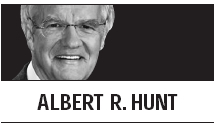Mitt Romney’s running mate, Representative Paul Ryan of Wisconsin, is a self-styled disciple of the late Jack Kemp, the buoyant conservative Republican who played a major role in shaping the political agenda in the last quarter of the 20th century.

The relationship was real. Ryan worked for Kemp as a speechwriter and at his research group; Kemp’s granddaughter was an intern in his protg’s congressional office.
Like his mentor, Ryan is passionate, exuberant, intellectually stimulating and devoid of the petty meanness that afflicts conservatives such as Newt Gingrich (and some liberals, too).
Cutting marginal tax rates to create an entrepreneurial society of opportunity is as central to Ryan’s philosophy as it was to Kemp’s.
Although they were more than a generation apart in age, there were personal similarities. Both are family men and outdoorsmen: Kemp was a skier; Ryan is a hunter and fisherman. Both loved professional football, Kemp as a star quarterback, Ryan as an avid fan of the Green Bay Packers.
The differences between them are equally interesting and instructive.
Kemp, for all his talent and charm, could be maddeningly undisciplined. This trait surfaced when he was the Republican vice presidential candidate in 1996, much to the consternation of the man who picked him, Bob Dole.
That’s not a worry for Romney. His 42-year-old running mate is disciplined, careful and always prepared. There is little danger of Ryan getting distracted or going off message in his debate with Vice President Joe Biden.
At the same time, Ryan lacks his mentor’s inclusiveness and empathy. Kemp was at a home in the barrio or the ghetto, where he sought to share his entrepreneurial American dream. That isn’t Ryan’s world. Black or Hispanic leaders would have been in Kemp’s rolodex and on a first-name basis with the ex-congressman from New York and secretary of Housing and Urban Development. With Ryan, these constituencies have a correct and distant relationship.
Until he died in 2009, Kemp was a committed champion for more immigration, which he believed was at the center of the American experience; and he advocated a pathway to citizenship for those in the U.S. illegally. Ryan equivocates, even if his views may not be that different. He ends up between Kemp and Romney, who turned into an immigration-basher in the 2008 and 2012 presidential primaries.
In sync on taxes, their views on spending and the role of government were different. Kemp came to Congress more than 40 years ago as a traditional small-government Republican; he evolved into a supply-sider who didn’t really want to slash government and proudly declared that he didn’t “worship at the shrine of the balanced budget.”
Kemp was one of the few members to serve on a congressional budget committee whose outlook wasn’t captured by that experience. That transcends party: The current chairman of the Senate Budget Committee, the Democrat Kent Conrad, is a genuine deficit hawk.
Ryan, as the current chairman of the House Budget Committee, is defined by his blueprint. Rarely has one House member so dominated an issue. His budget includes huge tax cuts that disproportionately benefit the wealthy and massive budget cutbacks to shrink the size of government.
With his intellectual prowess and personal appeal, Ryan is comfortable with elites. That includes some people who don’t share his views, though he doesn’t work the other side of the political aisle as well as Kemp did.
It will be revealing, and a mistake, if Romney tries to strike some distance from the Ryan budget. By picking the Wisconsin lawmaker, the presidential candidate is joined at the political hip to that proposal.
Yet the man and his plan aren’t as simple as depicted by allies and adversaries. Ryan is a supply-side tax cutter; unlike Kemp, he also wants to radically transform and reduce the role of government. Even his revised budget plan, with less draconian Medicare cuts almost surely would involve significant cutbacks in benefits. And the Medicaid cuts would fall hard on the poor and those with disabilities. Ryan believes this would produce a more vibrant economy and ultimately help the less fortunate.
He’s not, however, a huge deficit hawk; in that sense, like Kemp, he doesn’t worship at the altar of a balanced budget. The Ryan plan would take three decades to balance the budget; Romney promises to do it in a decade.
Ryan played a critical role in killing the bipartisan Bowles-Simpson deficit-reduction proposal. He was on the panel that recommended narrowing the deficit by $4 trillion, primarily through spending cuts, but also higher taxes. Unlike some other conservatives on the committee, such as Senator Tom Coburn of Oklahoma, Ryan voted against Bowles-Simpson; if he had voted for it, the proposal might have come to a vote in Congress.
Don’t be surprised if Ryan is attacked by some Democrats as a deficit dove. Kemp would have worn that as a badge of honor; his disciple probably won’t.
By Albert R. Hunt
Albert R. Hunt is Washington editor at Bloomberg News. The opinions expressed are his own. ― Ed.








